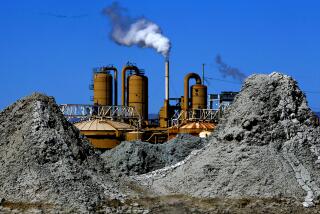Battery maker seeks a jump-start from U.S.
- Share via
Executives at Quallion, a lithium-ion battery maker, believe they can provide an energizing jolt to the Southern California economy if they’re able to secure a slice of the $2 billion in stimulus funds aimed at developing batteries for hybrid cars.
The Sylmar company, owned by California philanthropist and serial entrepreneur Alfred Mann, has already made believers out of the California Energy Commission, several members of Congress and the city of Palmdale. Now it needs the go-ahead from Uncle Sam.
Quallion’s quest is indicative of the potential rewards -- and incredible competition -- in the race to develop so-called green technology. Only seven or eight companies will receive grants to build factories to make lithium-ion batteries, believed by many to be the next step toward making hybrid cars more efficient and easier to mass produce.
The company is requesting $220 million to build a manufacturing plant that will produce more than 20,000 batteries a year for hybrid cars and trucks by 2012.
Quallion President Paul Beach said the plant would create about 400 construction jobs in Southern California. An additional 2,350 long-term “green-collar” jobs will be generated in-state and across the country as business picks up, he said.
But for Quallion to get the plan off the ground, it has to convince the U.S. Department of Energy -- which controls the stimulus funds -- that it deserves the money.
That won’t be an easy feat.
More than 120 companies submitted proposals for the funding, which includes about $1.5 billion for manufacturing plants like the one Quallion wants to build. The remaining $500 million will go toward other aspects of manufacturing.
The process is highly competitive, said Sara Bradford, an energy and power systems consultant with Frost & Sullivan. That’s because companies that receive stimulus funding will have a leg up on competitors in the effort to take the U.S. into the future of lithium-ion technology, she said.
Until now, U.S. companies were reticent to get into the lithium-ion business because research and development is expensive and, until recently, the outcomes were relatively uncertain, Bradford said.
As a result, Japanese, Chinese and South Korean manufacturers represent about 80% of the business -- in large part because their governments subsidize the work.
“The stimulus was necessary for the U.S. to be competitive on the world stage,” Bradford said. “Companies know this is their chance.”
Quallion got some wind in its sails in late June when a bipartisan California delegation of 17 U.S. representatives sent Energy Secretary Steven Chu a letter on the company’s behalf. Los Angeles County Supervisor Mike Antonovich, who represents the Palmdale area, also supports the award and will ask the Board of Supervisors to back it at a meeting Tuesday.
The city of Palmdale has offered the company more than $10.6 million in cost savings to build the plant there, including more than nine free acres in the Fairway Business Park, tax credits and fee waivers. The California Energy Commission said it would ante up as much as $9 million if Quallion receives the stimulus award.
Mann, whose net worth hovers around $1.4 billion, said he would also kick in a portion of the money needed to build the business.
“I’ll pony up my share of the costs if I have to,” Mann said.
Mann, who amassed his wealth in the medical device business, co-founded Quallion in 1998 as a business that could manufacture batteries for the products his other companies made.
Now, aside from the medical field, Quallion makes batteries for U.S. military and aerospace applications. The company expects more than $25 million in revenue this year.
Still, Quallion is a relative newcomer to the automotive field and may be an underdog in the competition for government funds, said Bradford, adding that the company’s competitors include A123Systems of Watertown, Mass., which has signed an agreement to supply Chrysler with batteries for the auto company’s electric vehicles.
Other rivals for the government grants include Compact Power Inc., a U.S. subsidiary of South Korea’s LG Chem, which is supplying lithium-ion batteries for the forthcoming Chevrolet Volt; and JC-Saft, a venture between Milwaukee-based Johnson Controls Inc. and French battery manufacturer Saft, which produces batteries for a Mercedes hybrid sedan.
Bob Kanode, chief executive and president of Valence Technology Inc., another competitor applying for funds, said certain companies appeared closer to securing the funds because of their familiarity with the automotive market, but nothing was for certain.
“It’s a juggling act,” said Kanode, whose Austin, Texas, company provides batteries for Segway personal transporters and for some of London’s famous double-decker buses. “The government wants to put people to work, and they want to put money behind fresh ideas. If Quallion can do both, they have a chance.”
Quallion executives think they have both areas covered with a lithium-ion battery that keeps heavy-duty trucks’ air-conditioning or heat running while the engine is off. Such a product would be aimed at meeting anti-pollution laws in about 20 states, including California, that limit the amount of time big-rigs can idle.
Quallion already secured a $951,000 earmark to work on the anti-idling technology, and hopes that will help in snagging the stimulus funds.
“We’re ready to move forward on this; we think it could have big implications for us and Southern California as a whole,” Beach said. “Now we just wait and see what the government has to say.”
--
More to Read
Inside the business of entertainment
The Wide Shot brings you news, analysis and insights on everything from streaming wars to production — and what it all means for the future.
You may occasionally receive promotional content from the Los Angeles Times.











